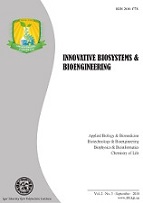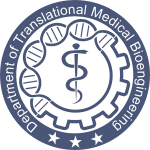Evaluating the Interaction Between Silicon Surface and Microorganisms in Various Solvents Under the Influence of a Static Magnetic Field Using Fractal Analysis
DOI:
https://doi.org/10.20535/ibb.2024.8.2.297364Keywords:
yeast, algae, probiotic lactocultures, Magnetic field, silicon wafer, solvents effect, dried cells, fractal dimension, lacunarityAbstract
Background. Peculiarities of the interaction of microorganisms with the surface are important from the point of view of the functionality of this surface (implants, chips, electrodes with biofilm for producing electric current). The orderliness of organic particles and cells on different surfaces can be assessed by determining the fractal dimension and lacunarity and indicate the structural state or efficiency of the system.
Objective. Investigation how different solvents and the application of a magnetic field affect the texture of suspensions containing microorganisms when dried on various types of silicon surfaces and quantitatively assess the dimensions of the structures formed using fractal analysis.
Methodology. After mixing, the cell suspension was applied to the polished, degreased surface of silicon wafers arranged horizontally and left to dry completely. In a static magnetic field (MF) with an induction of 0.17 T, the induction lines were perpendicular to the surface of the sample. Micrographs of dried cells were processed in software package ImageJ and fractal analysis was performed using the FracLac software application and "Box counting" technique.
Results. Significant differences in the self-organization of various types of microorganism cells during drying on silicon surfaces under the influence of a MF and in different solvents have been found. The tendency for various types of microorganisms was the formation of pseudofractal shapes and an increase in the average fractal dimension D under the action of a MF. As D increased, lacunarity L decreased. However, in the case of yeast suspended in a physiological solution, pseudofractal shapes were observed even in the absence of a MF.
Conclusions. Using fractal analysis of pseudofractal figures consisting of cells of microorganisms on the surface of a silicon plate under the influence of MF, it is possible to evaluate the functionality of cells interacting with the surface, as well as the quality of this surface.
References
Haken H. Synergetics: An introduction. Nonequilibrium phase transitions and self-organization in physics, chemistry and biology. Berlin: Springer; 1977, 325 p. DOI: 10.1007/978-3-642-96363-6
Mandelbrot B. The fractal geometry of nature. New York: W. H. Freeman and Co.; 1982. 468 p.
Koltysheva D, Shchurska K, Kuzminskyi Y. Microalgae and cyanobacteria as biological agents of biocathodes in biofuel cells. BioTechnologia. 2021;102(4):437-44. DOI: https://doi.org/10.5114/bta.2021.111108
Srivastava SK, Piwek P, Ayakar SR, Bonakdarpour A, Wilkinson DP, Yadav VG. A biogenic photovoltaic material. Small. 2018 Jun;14(26):e1800729. DOI: 10.1002/smll.201800729
Tarasevich YY. Mechanisms and models of the dehydration self-organization in biological fluids. Physics Uspekhi. 2004;174(7):779-90. DOI: 10.1070/PU2004v047n07ABEH001758
Bondar II, Suran VV, Minya OY, Shuaibov OK, Krasylynets VM, Solomon A.M. Preparation of films with ordered structure during laser-stimulated evaporation of water solution of copper sulphate. Nanosyst Nanomater Nanotechnol. 2021;19(3):537.
Glibitskiy DM, Gorobchenko OA, Nikolov OT, Cheipesh TA, Dzhimieva TN, Zaitseva IS, et al. Method of estimation of the influence of chemical and physical factors on biopolymers by the textures of their films. Radiofiz. Electron. 2019;24(1):58-68. DOI: 10.15407/rej2019.01.058
Smith A, Abir FZ, El Hafiane Y, Launay Y, Faugeron-Girard C, Gloaguen V, et al. Fractal structures and silica films formed by the Treignac water on inert and biological surfaces. Nanoscale Adv. 2020 Aug 12;2(9):3821-8. DOI: 10.1039/d0na00377h
Losa GA. Fractals in biology and medicine. In: Meyers RA, editor. Encyclopedia of Molecular Cell Biology and Molecular Medicine. 2011. DOI: 10.1002/3527600906.mcb.201100002
Chen R, Zhang L, Zang D, Shen W. Blood drop patterns: Formation and applications. Adv Colloid Interface Sci. 2016 May;231:1-14. DOI: 10.1016/j.cis.2016.01.008
Elkington L, Adhikari P, Pradhan P. Fractal dimension analysis to detect the progress cancer using transmission optical microscopy. Biophysica. 2022;2(1):59-69. DOI: 10.3390/biophysica2010005
Dokukin ME, Guz NV, Gaikwad RM, Woodworth CD, Sokolov I. Cell surface as a fractal: normal and cancerous cervical cells demonstrate different fractal behavior of surface adhesion maps at the nanoscale. Phys Rev Lett. 2011 Jul 8;107(2):028101. DOI: 10.1103/PhysRevLett.107.028101
Obert M, Pfeifer P, Sernetz M. Microbial growth patterns described by fractal geometry. J Bacteriol. 1990 Mar;172(3):1180-5. DOI: 10.1128/jb.172.3.1180-1185.1990
Nai GA, Martelli CAT, Medina DAL, de Oliveira MSC, Caldeira ID, Henriques BC, et al. Fractal dimension analysis: A new tool for analyzing colony-forming units. MethodsX. 2021;8:101228. DOI: 10.1016/j.mex.2021.101228
Matos RS, Gonçalves ECM, Pinto EP, Lopes GAC, Ferreira NS, Resende CX. Nanoscale morphology, structure and fractal study of kefir microbial films grown in natura. Polímeros. 2020;30(3). DOI: 10.1590/0104-1428.04020
Nizhelska OI, Marynchenko LV, Makara VA, Naumenko SM, Kurylyuk AM. The stabilizing effect of magnetic field for the shape of yeast cells Saccharomyces cerevisiae on silicon surface. Innov Biosyst Bioeng. 2018;2(4):278-86. DOI: 10.20535/ibb.2018.2.4.151881
Marynchenko L, Nizhelska O, Kurylyuk A, Naumenko S, Makara V. Observed effects of electromagnetic fields action on yeast and bacteria cells attached to surfaces. In: Proceedings of 2020 IEEE 40th International Conference on Electronics and Nanotechnology; 2020 Apr 22-24; Kyiv, Ukraine. DOI: 10.1109/ELNANO50318.2020.9088883
Pavlovska MM, Kostikov IY. Cell types and their status in Chlamydomonas-like algae (Chlorophyceae) on agar medium culture. Modern Phytomorphol. 2014;5:285-90. DOI: 10.5281/zenodo.161040
Imagej [Internet]. [cited 2024 Jun 20]. Available from: https://imagej.net/ij/
Jelinek HF, Milošević NT, Karperien A, Krstonošić B. Box-counting and multifractal analysis in neuronal and glial classification. In: Dumitrache I, editor. Advances in Intelligent Control Systems and Computer Science. Vol. 187. Berlin: Springer. 2013. p. 177-89. DOI: 10.1007/978-3-642-32548-9_13
Jelinek HF, Elston N, Zietsch B. Fractal analysis: pitfalls and revelations in neuroscience. In: Losa GA, Merlini D, Nonnenmacher TF, Weibel ER, editors. Fractals in biology and medicine. Mathematics and biosciences in interaction. Basel: Birkhäuser Verlag; 2005. pp. 85-94. DOI: 10.1007/3-7643-7412-8_8
Smith TG Jr, Lange GD, Marks WB. Fractal methods and results in cellular morphology - dimensions, lacunarity and multifractals. J Neurosci Methods. 1996 Nov;69(2):123-36. DOI: 10.1016/S0165-0270(96)00080-5 8946315
Karperien A, Jelinek H. Fractal, multifractal, and lacunarity analysis of microglia in tissue engineering. Front Bioeng Biotechnol. 2015;3:51. DOI: 10.3389/fbioe.2015.00051
Makara VA, Steblenko LP, Korotchenkov OA, Nadtochiy AB, Kalinichenko DV, Kuryliuk AN, et al. The features of magneto-stimulating change of surface electric potential in silicon crystals used for the needs of solar energetics and microelectronics. Nanosyst Nanomater Nanotechnolog. 2014;12(2):247-58.
Tazhibaeva SM, Musabekov KB, Orazymbetova AB, Zhubanova AA. Surface properties of yeast cells. Colloid J. 2003;65(1):122-4. DOI: 10.1023/A:1022391613491
Murga MLF, de Valdez GF, Disalvo AE. Changes in the surface potential of Lactobacillus acidophilus under freeze-thawing stress. Cryobiology. 2000 Aug;41(1):10-6. DOI: 10.1006/cryo.2000.2259
Martynyuk VS, Nizhelska AI. Dissipative structures formation upon EHF EMF action on the "water and dye" system. Phys Alive. 2009;17(1);105-11. Available from: https://biophys.biomed.knu.ua/pa_archive/Archive/2009%20N1/Martynyuk%20Nizhelska%20N%201%202009.pdf
Downloads
Published
How to Cite
Issue
Section
License
Copyright (c) 2024 The Author(s)

This work is licensed under a Creative Commons Attribution 4.0 International License.
The ownership of copyright remains with the Authors.
Authors may use their own material in other publications provided that the Journal is acknowledged as the original place of publication and National Technical University of Ukraine “Igor Sikorsky Kyiv Polytechnic Institute” as the Publisher.
Authors are reminded that it is their responsibility to comply with copyright laws. It is essential to ensure that no part of the text or illustrations have appeared or are due to appear in other publications, without prior permission from the copyright holder.
IBB articles are published under Creative Commons licence:- Authors retain copyright and grant the journal right of first publication with the work simultaneously licensed under CC BY 4.0 that allows others to share the work with an acknowledgement of the work's authorship and initial publication in this journal.
- Authors are able to enter into separate, additional contractual arrangements for the non-exclusive distribution of the journal's published version of the work (e.g., post it to an institutional repository or publish it in a book), with an acknowledgement of its initial publication in this journal.
- Authors are permitted and encouraged to post their work online (e.g., in institutional repositories or on their website) prior to and during the submission process, as it can lead to productive exchanges, as well as earlier and greater citation of published work.









